- Learning time
- 60 minutes
- First play time
- 180 minutes
One Small Step
Designed by: Gunter Eickert,James DuMond,James Schoch
One Small Step sees two players (or two teams of two) representing Russia and the USA in the race to get man on the moon. Historically of course, Neil Armstrong had the honour, but the game allows players to reimagine history in their own designs: each team has two administrators and two engineers, and distinct professions can take distinct actions. Taking an action simply means putting one of your team out on the board and taking the action printed on it: it might be getting a resource of some kind, allow you to play a card, increase your media profile (which determines turn order) or upgrading a temporary resource into a permanent one: these can be used once per round, whereas the temporary ones are just that. As with most games that function in this way, when an action space is occupied by a team member, no other team member can take that action.
Although there’s a simpler training mission game included, and advised as a way to learn, even this is fairly complicated and the full game has multiple actions available to players, nine types of resources, two types of space mission, a full deck of events, seven phases to play through in every round and enough iconography to feel akin to uncovering a mystical series of hieroglyphs: explaining it all here would be akin to 2 minute YouTube video assuring you you’ll be a rocket scientist by the end of it. Instead we’ll keep things reasonably conceptual: broadly speaking, your goal is to reach the moon – using crewed missions – but you can also gain rewards by launching orbital missions as well. In either case, these missions – represented by cards – have certain resource demands: fuel, navigation, sensors, capsules, landing capacity and so on. As you launch at least one mission in every single round, the short term objective is to make sure it succeeds, by having the resources you need. For the Animal Flight mission, for instance, I need two fuel and one capsule to succeed, and pay them to get the rewards on the card. If I have a second capsule, navigation and life support, I succeed very well and receive a second round of rewards: rewards might be an increased media presence (for establishing turn order) more resources, special abilities, unlocking juicier actions on the board, pushing your country’s marker further on towards the moon, or simply points.
So the nub of the game is always finding a way to facilitate your missions, but there’s a fair few shenanigans mixed in: as well as the standard actions there are four additional, randomized actions in every round, offered by four face-up cards. Event cards can be played for resources. Each team can have as many as three astronauts at their disposal, paying personnel resources to utilise them in every round. These are sometimes a bit of a thematic stretch on a micro-scale – Ed White might produce funding, materials or personnel – but the overall impression is kind of intact: you’re an agency juggling needs both in the cosmos and terra-ferma.
We’ve not mentioned a few things such as media tokens or how failed missions can punish you – especially late-game – but it’s worth mentioning the opportuinity to sabotage the opposition. The game is set during the cold war, and if the animosity between space agencies wasn’t anything like their respective governments, the competition was fierce. One Small Step allows you to potential sabotage each other’s missions by adding a hidden criteria that’s only revealed in the launch stage: it might simply be getting one less reward than the successful mission would otherwise receive. It might demand extra personnel, or sensors, or fuel. If the sabotaged agency has the resources at their disposal, all well and good. If they don’t: the mission fails!
The game continues, then, cycling through the seven phases of each round, with players improving their agencies, hiring astronauts, upgrading actions and launchign missions, until one or another team reaches the moon: at this point the game ends, and the team with the most points takes the cosmic laurels.
The guru's verdict
-
Take That!
Take That!
Actions are blocked every round, and more than that, rockets tend to be on the receiving end of unwanted attention from the other side: so yes.
-
Fidget Factor!
Fidget Factor!
Very high when the various phases and symbology of the game are new. Dropping to a more moderate tactical-planning level with familiarity. A first play may seem like the cold war itself, but when things swim into focus One Small Step speeds up to a brisker pace.
-
Brain Burn!
Brain Burn!
The main thing is to launch and succeed at missions, which begin relatively easily - the starting orbital missions only need two resources - but ramp up as you try and push your team to lunar victory.
-
Again Again!
Again Again!
There's so much going on in One Small Step that it's impossible any game will closely resemble the last.

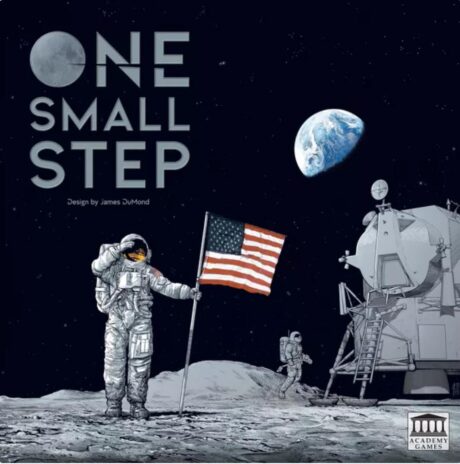
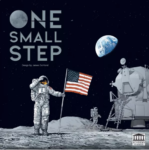

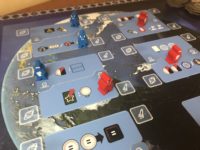
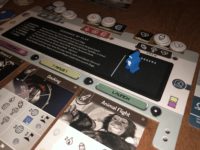
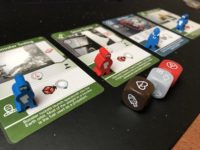

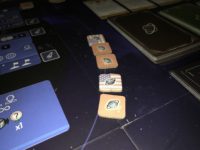


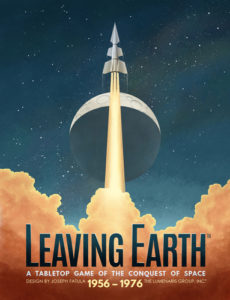

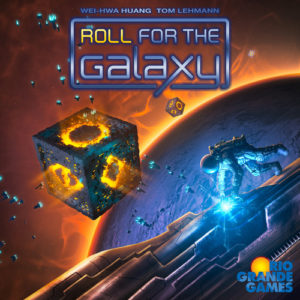
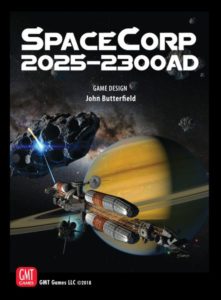

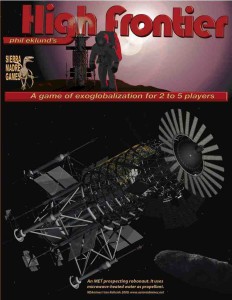
Sam says
Whew. It's probably a complexity 3 really but we're giving it 4 because at first glance the phases and resources and rules and iconography can seem overwhelming: this isn't a sleek design by any stretch, and learning it is not that dissimilar to being an actual NASA employee (I imagine - could be wrong). There's a guide to the iconography on the back of the rulebook that misses out one or two icons that turn up on cards or tokens, and with my accessibility hat on I do feel the game could have been boiled down a little into something less... busy. But. That said, what I delight in in games like this is that you can tangibly feel the designer's love for the theme: it's a little sprawling and messy and complex because they didn't want to leave anything out, and if the smaller cogs might sometimes feel incongruous the larger ones really establish a sense of narrative: many games advertise a theme that drops away into abstraction whilst playing, and One Small Step avoids that with distinction. Partly perhaps because it can feel a bit like rocket science itself. Partly because for a game that is essentially get stuff to launch rockets, it has enough going on around that central conceit to avoid a sense of repetition. The potential final missions being sabotaged by both sides can throw up the most dramatic endings, with someone snatching victory from the jaws of a cold, airless defeat.